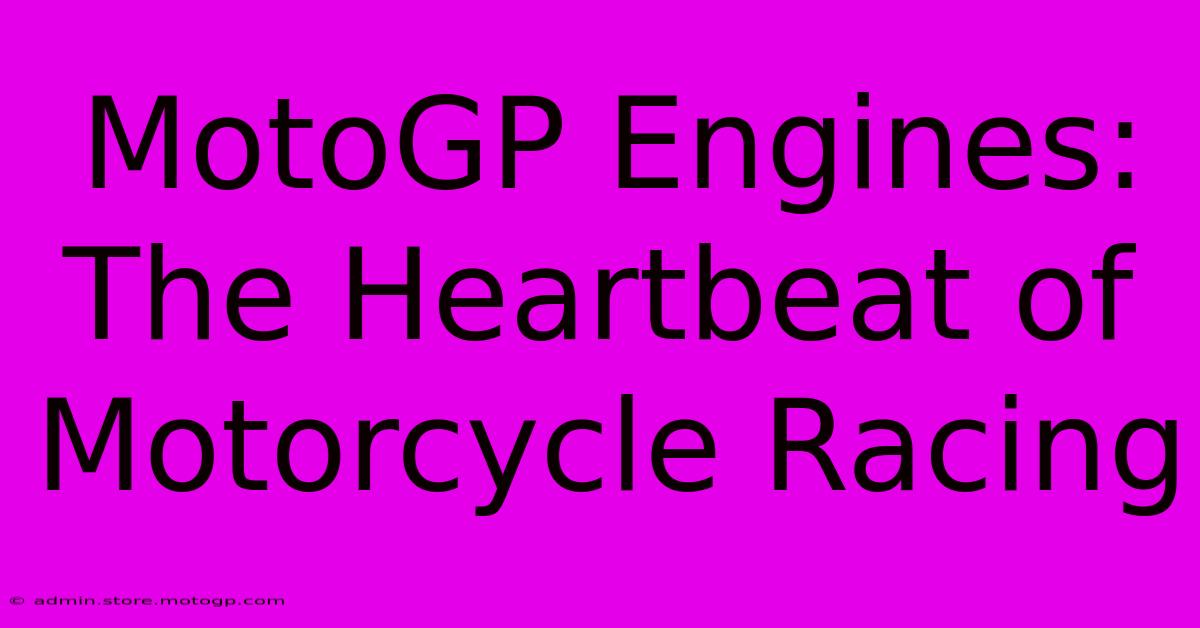MotoGP Engines: The Heartbeat Of Motorcycle Racing

Table of Contents
MotoGP Engines: The Heartbeat of Motorcycle Racing
MotoGP, the pinnacle of motorcycle road racing, is a spectacle of speed, skill, and technological marvel. At the heart of this exhilarating competition lies the engine – a finely tuned masterpiece of engineering pushing the boundaries of performance. This article delves into the intricacies of MotoGP engines, exploring their design, power, and the relentless pursuit of innovation that defines this class of racing.
The Powerhouse: Understanding MotoGP Engine Specifications
MotoGP engines are four-stroke, 1000cc prototypes, representing the cutting edge of motorcycle engine technology. These aren't your everyday production engines; they're highly specialized units built for maximum power output and unwavering reliability under extreme conditions. Let's break down some key specifications:
- Displacement: 1000cc (maximum) – This dictates the engine's potential power output.
- Configuration: Typically inline-four cylinder configurations are dominant, though other configurations have been experimented with in the past. This configuration provides a good balance of power, smoothness, and compactness.
- Material: Engine components are constructed from lightweight yet incredibly strong materials like titanium, magnesium, and carbon fiber, minimizing weight for optimal performance.
- Fuel: Specific fuel specifications are regulated by the governing body (FIM), ensuring a level playing field and environmental considerations.
- RPM: These engines operate at incredibly high RPMs (revolutions per minute), often exceeding 16,000 RPM, extracting maximum power from each combustion cycle.
- Power Output: While exact figures are closely guarded secrets by the teams, it's estimated that these engines produce well over 260 horsepower, perhaps even exceeding 280hp in some cases. This immense power is harnessed through sophisticated electronics and rider skill.
Beyond the Numbers: Innovative Engine Design
The raw power figures are only part of the story. MotoGP engine development focuses relentlessly on refining several key aspects:
- Valve Train: Sophisticated pneumatic valve systems allow for incredibly high RPM operation and precise valve timing control, maximizing power and efficiency.
- Fuel Injection: Highly advanced fuel injection systems, precisely controlling the fuel-air mixture, are crucial for optimizing combustion and power delivery.
- Electronics: Sophisticated engine management units (EMUs) monitor and control numerous engine parameters, constantly adjusting fuel delivery, ignition timing, and other factors to optimize performance in real-time. This includes sophisticated traction control and wheelie control systems.
- Aerodynamics: While not directly part of the engine, engine position and the overall aerodynamic package significantly impact performance. The position and shape of the engine contribute to the overall aerodynamics of the motorcycle, improving handling and speed.
The Quest for Continuous Improvement: Evolution of MotoGP Engines
The world of MotoGP is a constant arms race in innovation. Teams continuously refine their engines, pushing the boundaries of what's possible. Each season witnesses incremental improvements, with manufacturers vying for the slightest edge in performance. This constant drive for innovation translates to:
- Lightweight Materials: The ongoing search for lighter materials, without compromising strength, is a paramount goal.
- Improved Aerodynamics: Aerodynamic advancements are equally important, affecting not only top speed but also cornering stability.
- Sophisticated Electronics: Engine management systems become more sophisticated each year, allowing for more precise control and adaptation to changing track conditions.
Conclusion: The Heart of the Competition
MotoGP engines are more than just power units; they are testaments to human ingenuity and the relentless pursuit of performance. Their intricate designs, innovative technologies, and continuous evolution are what make MotoGP the thrilling and technologically advanced spectacle it is. The next time you witness the breathtaking speed and agility of a MotoGP machine, remember the sophisticated engine at its heart—a true masterpiece of engineering.

Thank you for visiting our website wich cover about MotoGP Engines: The Heartbeat Of Motorcycle Racing. We hope the information provided has been useful to you. Feel free to contact us if you have any questions or need further assistance. See you next time and dont miss to bookmark.
Featured Posts
-
Moto Gp The Excitement Of The Moto Gp Classification
Feb 19, 2025
-
Moto Gp Starting Grid The Importance Of Clutch Control
Feb 19, 2025
-
F1 Austin Tv Schedule All The Details One Convenient Place
Feb 19, 2025
-
F1 Austin 2025 Get Your Heart Racing
Feb 19, 2025
-
Cota Parking Map Navigate Cota Parking With Confidence
Feb 19, 2025
